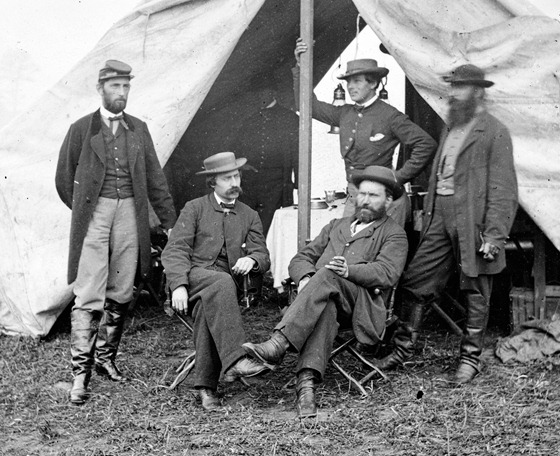Maryland Heights, Va., September 21st, 1862.
Toward evening of the 13th we left Frederic City and marched out on the National Turnpike toward South Mountain, and halted for supper and a few hours rest near Middleton. It was nearly midnight. We had made a rapid march of several miles, and were tired, and hungry as wolves. Hardly had we stacked arms when Lieutenant Rath inquired: “Where’s John Conley?” John could not be found; he was already off on an expedition of his own. “Well, then,” said Rath, “send me the next best thief; I want a chicken for my supper.”
Our foragers soon returned; the Lieutenant got his chicken, and we privates were fairly well supplied with the products of the country. It strikes me as a little strange, the facility with which a soldier learns to steal his grub. It must be the effect of heredity. Perhaps, in the dim past, when our ancestors went on “all fours,” and roamed the forests in search of food; possibly at a more recent date, but before a name was given to the deed; they formed the habit of taking what they wanted wherever it could be found, provided they had the physical power, or mental cunning, to accomplish it, and this habit, thus formed, became instinct, and was transmitted to their descendants. At daylight we were on the move, headed for South Mountain. We had an inkling—how obtained I do not know; mental telepathy, perhaps, that occult, mysterious power that enables us to divine the most secret thoughts of men—that a mass meeting was to be held on that eminence to discuss the pros and cons of secession, and that we, the Seventeenth, had received a pressing invitation to be present. The Pike was in fine condition. Our men stepped off briskly, with long, swinging strides that carried them rapidly over the ground. We marched in four ranks, by companies, and were led by our gallant Colonel Withington. Company G was seventh from the front, which gave me a view of over half the regiment. And it was good to look upon. Only two weeks from home, our uniforms were untarnished. Dress coats buttoned to the chin; upon our heads a high-crowned hat with a feather stuck jauntily on one side. White gloves in our pockets; a wonder we did not put them on, so little know we of the etiquette of war.
As we neared the mountain, about nine o’clock in the morning, I scanned its rugged sides for indications of the presence of our friends, the enemy, and, as I looked, I saw a puff of smoke, and on the instant a shell sped howling above our heads, bursting some half a mile beyond.
Every man of us “bowed his acknowledgments;” then, as by one impulse, every spine became rigid; every head was tossed in air; as if we would say; “My Southern friend, we did the polite thing that time. No more concessions will you get from us and—may God have mercy on your souls.” Of our exploits on South Mountain I will not write. They will be woven into history and will be within the reach of all. About thirty of our brave boys were killed, and over one hundred wounded. Captain Goldsmith was wounded in the shoulder and Lieutenant Somers in the side. A number of Company G boys were wounded, but none were killed in this battle.
Eli Sears, the best, the most universally beloved of the regiment, is dead. He died the second day after the battle. A rifle ball, early in the engagement, struck him in the left breast and passed entirely through him. When I saw him he was so low he could only speak in whispers. He gave me his hand, with a pleasant smile, and told me he had but a few more hours to live. Bitterly do I mourn his loss. So kind, so thoughtful, always preferring another to himself. He died as heroes die, as calm and peaceful as an infant on its mother’s breast. Albert Allen, Carmi Boice and Charlie Goodall were in the thickest of the fight and escaped unhurt.
The Seventeenth has been baptised in blood and christened “Stonewall.” The battle of Antietam was fought on Wednesday, September 17th, three days after South Mountain. The Seventeenth did not lose so many in killed—eighteen or twenty, I think, although the list is not yet made out—and eighty or ninety wounded. Company G lost three killed, among whom was Anson Darling. We crossed the Antietam River about 1 p. m., and about three o’clock charged up the heights, which we carried, and advanced to near Sharpsburg. Here, our ammunition giving out, we fell back behind the hill and quietly sat down ‘mid bursting shells and hurtling balls until relieved. As we sat waiting, a spent ball—a six-pounder—struck a tree in front of us. Not having sufficient momentum to penetrate, it dropped back upon the toe of my comrade on my left. With a fierce oath he sprang to his feet and shouted, “Who the h—1? Oh!”
That night, while on picket, when all my comrades were wrapped in slumber, and silence reigned where, a few hours before, the tumult of battle raged, my willing thought turned to my Northern home. The most vivid pictures arose before me—so real—could they be imagination? And as I gazed upon these fancied visions and pressed them to my soul as a living reality, I asked myself the question, “Can this be homesickness?” The answer came, quick and decisive: No; I have never seen the time—even for one short moment—that I could say to myself, “If I had not enlisted, I would not.” On the contrary, if, after the little experience I have had, and the little knowledge I have gained, I had not enlisted, I would do so within the hour.











